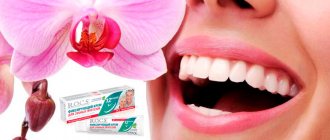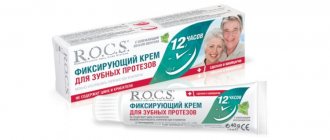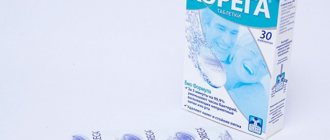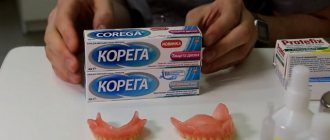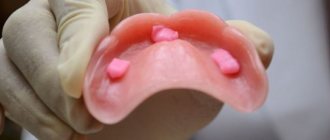One of the main problems that people with removable dentures face is insufficiently secure fixation. Despite careful individual selection, the structure can move while chewing food, talking, or laughing. This occurs due to insufficient adherence of the inner surface of the denture to the gum.
The solution to the problem is the use of special fixing substances. Today, the range of these products is widely represented in the windows of pharmacies and supermarkets. The products are produced in the form of a cream or gel.
Television advertising promises an immediate and long-lasting effect, but the consumer has a lot of questions: what to choose and should you believe the advertising?
Cream for fixing dentures
This is the most popular substance, suitable for all types of removable dental structures. Many customers ask the pharmacy for glue to fix dentures. But if you look at it, cream and glue are the same thing.
Yes, it really allows you to securely fix the removable structure on the surface of the gums. But which brand of denture bonding cream is best on the market?
Criteria for a quality fixing cream
- Duration of action
. The duration of fixation is one of the main characteristics. The instructions for modern creams state that they are able to hold a denture for 12-24 hours. It is more convenient when the fixation agent works all day long. In this case, there is no risk of unexpected detachment of the prosthesis at the most inopportune time. - Safety
. The fixing cream or glue should not contain substances that are toxic or damaging to the mucous membrane. This will ensure safe use of the product over a long period. - Structure
. Manufacturers specially produce fixing agents with different consistencies so that the consumer can choose the product for themselves. The gel is most often liquid, so it is easier to apply, but at the same time its consumption increases. Liquid products are recommended for the first time after dental prosthetics. Cream or glue has a thicker consistency. However, it must be applied in doses to the prosthesis, because an excess of the substance has a negative effect on the fixing properties. - Additional ingredients
. Thanks to the auxiliary components included in the cream, you can not only ensure reliable attachment of the denture, but also freshen your breath and reduce gum inflammation.
Choosing a fixing agent for dentures
An important problem that people face after removable prosthetics is high-quality fixation of the prosthesis. There are many different fixing agents of varying quality. It is worth knowing how to make the right choice among this variety.
Quality criteria for fixatives Creams and gels can be used for fixation. The first option is more popular. You need to understand that the concepts of “glue” and “cream” are one and the same.
How to choose the right fixing adhesive: 1. Period of action. A high-quality cream should hold for a long time so that there is no psychological discomfort that its effect is about to cease. The optimal period is 12-24 hours. It is most convenient when the cream fixes for the whole day. In this case, there will be no situation where you urgently need to replace the glue at the wrong time. 2. Security. This is a very important criterion, because some products can cause irritation and allergies. The cream must be hypoallergenic and free of toxic substances so as not to irritate the mucous membranes. 3. Additional components. Some beneficial supplements, for example, help freshen breath or prevent inflammation. 4. Structure. Products with different consistencies are specially made so that everyone can choose the most optimal option. Liquid creams are recommended for use during the period of getting used to dentures. Thicker products need to be applied pointwise and carefully, because excess will have a bad effect on the quality of fixation.
Popular representatives:
- Corega cream is known to everyone thanks to widespread advertising. And this is truly a quality product. The line includes several options for creams - refreshing, extra-strong mint and neutral. Corega provides high-quality hold throughout the day. It can be used daily. Corega is applied in strips to the structure itself. After fixing, you need to rinse your mouth well to get rid of any residue. The prosthesis should be pressed well and waited for about 10 minutes without loading it. Then you can eat and talk in peace. It holds very well, so you may have to take it out yourself at the end of the day. First you need to rinse your mouth with warm water, then gently try to remove it with rocking movements. After this, you need to rinse the denture itself and your mouth thoroughly.
- Rox is another popular representative of fixing agents. Its features include: — Availability. You can buy it in almost every pharmacy; — Suitable for structures made of a wide variety of materials; — It can be applied to a wet or dry prosthesis; — There is no zinc or dyes in the composition, which makes this product safe; - Economical consumption - one tube is enough for about 1.5 months.
Features of fixing gels Gels have many disadvantages (relative to creams): - Short fixation - you will have to apply the gel several times a day; — While wearing a prosthesis, it is not recommended to eat or drink hot foods; — Liquid consistency requires increased consumption.
Gels are usually used immediately after prosthetics, when the patient learns to fix the prosthesis correctly. What side symptoms may there be? A high-quality cream should not cause adverse reactions, but in case of an overdose, unpleasant symptoms may appear. To avoid them, you must strictly follow the instructions.
Possible side effects: • Hypersalivation; • Allergies; • Vomiting; • Malaise.
If unpleasant symptoms appear, you need to go to the dentist. The doctor will assess the condition and be able to recommend the most optimal means for fixation.
Sign up for prosthetics and consultation at Cosmodent!
Cream "Korega" for dentures
One of the leaders in the fixing agents market. The line consists of 3 types:
- extra strong mint;
- neutral;
- refreshing.
According to data, it ensures fixation of a removable denture throughout the whole day. It comes with mint or neutral flavor. The cream does not contain zinc, so it can be used on an ongoing basis.
How to apply cream
Fixing cream for dentures "Korega" is applied in strips to the inside of the previously cleaned insert structure. It is also necessary to rinse your mouth to remove any remaining food.
After pressing the prosthesis to the gums, the product should not enter the oral cavity. After attaching the structure, it is not recommended to immediately start eating. For strong fixation, you need to wait 10-15 minutes.
Removing the prosthesis
Corega glue reliably fixes dentures, so it is possible that you will need to remove the structure yourself at the end of the day. It's easy to do:
- First you need to rinse your mouth with warm water.
- Then, using rocking movements, try to remove the denture from the oral cavity.
- If it is still fixed, you need to lightly press on the gum mucosa from the cheeks and remove the denture.
- After removing the denture from the oral cavity, it should be thoroughly rinsed using special products recommended by the manufacturer of the fixing cream.
How to use it correctly
Regardless of consistency, price and manufacturer, most fixing creams are used in an identical way:
- Wash the removable product thoroughly with a soft brush and soapy water, and air dry for a couple of minutes.
- Next we use the cream itself. Almost every instruction shows a visual illustration of where the product needs to be applied.
- Put on the prosthesis in the standard way, carefully pressing it against the mucous membrane for at least one minute.
- Try to eliminate food and even water for half an hour.
- Before removing your orthotic, first rinse your mouth with warm water.
The frequency of use of the cream depends on the duration of fixation. This information can be read on the packaging. Experts do not recommend using this product more than once a day. Otherwise, irritation of the mucous membrane and even allergies may begin.
Cream "Rox" for dentures
Another popular means for fixing dentures is Rox cream. This is a joint development of domestic and European specialists, capable of holding a removable structure for 12 hours even when drinking hot drinks. The mint extracts included in the composition freshen breath for a long time.
Among the features of the cream are:
- No dyes or zinc, which makes it safe for long-term use.
- Suitable for prostheses made of various materials. Rox glue is suitable for fixing dentures made of plastic, nylon and other composites.
- Economical. Due to the dense structure of the cream, consumption is minimal. One tube will last approximately 1.5-2 months.
- Application. Rox cream can be applied to both dry and wet dentures. This does not affect the quality of fixation.
- Availability. You can buy Rox cream for dentures in almost every pharmacy or supermarket.
The production of fixatives for dentures continues to develop, and new, better quality creams appear periodically. It is quite difficult to keep track of this on your own. Therefore, if you want to choose the best cream for fixing dentures, consult your dentist.
Fixing creams for removable dentures, parameters for choosing the right one
Publication date:
29-04-2020
Updated:
09-09-2020
Removable dentures are designed to improve a person’s quality of life and are considered the most cost-effective method of prosthetics. But, when wearing this design, there is a problem - insufficient fixation, that is, their mobility. This uncomfortable state makes it impossible to lead a normal lifestyle: eat, smile, talk. To enhance the reliable fixation of dentures, special creams have been developed. In addition to the main task, such products prevent food from getting stuck between the teeth and create a feeling of freshness in the oral cavity. Each of us is individual. The special structure of the jaw or seemingly minor gaps in the manufacture of dentures can affect the low adhesion effect. It is in such cases that you have to resort to additional fixing agents.
Criteria influencing the choice of fixative drug. To decide which fixing cream is most suitable for you for dentures, let’s list the parameters for choosing them:
- duration of fixation of the prosthesis (adhesion period);
- resistance to temperature changes;
- connection reliability;
- protection against penetration of food under the prosthesis (tightness);
- aromatic ingredients included in the cream;
- the absence of zinc in the composition of the drug, which has an ambiguous effect on the body;
- simplicity and clarity of use;
- the price of the product;
- volume of the drug in the tube (how long it can be used).
Today, there is an impressive list of creams for fixing removable dentures on sale. When choosing this or that product, study all the pros and cons in advance. The principle of action of fixing creams. All fixatives are based on polysaccharides and polypeptides. These components tend to expand when in contact with a moist environment. First, the cream is applied to the denture. Next, the structure is placed on the gum. The applied product immediately begins to act. The evenly distributed elastic layer takes on the contours of all oral surfaces, thereby imparting reliable adhesion of the prosthesis to soft tissues. Such creams are especially recommended for use during the period of adaptation to dentures, when the oral cavity is not yet accustomed to wearing a new design. Thanks to fixing agents, it is possible to minimize the likelihood of injury and irritation of the oral cavity. The most famous creams for fixing removable dentures. So, let's list the best fixing agents today:
- ROCS This Russian-Swiss brand has a high quality rating in the pharmaceutical market. The product of the presented brand can be bought in every city. The price goes up to 350. The drug guarantees the fixation of dentures for 12 hours. The tube contains 40 grams of product. The cream is quite thick, so it should be applied slowly and patiently. But a sufficiently long neck allows you to evenly dose the product in small portions, creating an airtight layer. To avoid bad breath, the cream contains natural ingredients - menthol and mint. Does not contain zinc, known for its negative effects on the human body. Does not wash out from the base when rinsing the mouth. When you eat food at different temperatures, you don’t have to worry that the applied cream will dissolve. It is also acceptable to apply the product to wet dentures;
- LAKALUT dent. The German brand company has proven itself well among dental and oral care products. The price of the drug reaches 400. Often, the edges of the denture rub against soft tissue, thereby injuring the gums. Thanks to LAKALUT dent cream, an invisible layer is formed that prevents any mechanical damage to the gums. A thin film creates a good seal. At the same time, the taste of the food remains unchanged. The manufacturer promises strong fixation of dentures within 24 hours. Using this brand of cream does not change the bite. There was no unpleasant odor from the mouth. On the contrary, a refreshing minty taste. But, there is a serious drawback - when eating hot food, the adhesion between the dentures and soft tissues weakens slightly;
- Protefix. Manufacturers of the German company present a whole series of products for the care of artificial teeth. The fixing cream of this brand is available in tubes of different sizes: 27 g of the product can be bought at a pharmacy for about 150, and a tube of 45 g will cost 300-400 rubles. Agree, it is convenient and economical. Especially if you decide to purchase the drug as a trial. Good adhesive properties promise strong hold for 10-12 hours. It is also acceptable to use the product on wet dentures. The ointment is evenly distributed over the areas of application. The manufacturer has also taken care of those who want to choose. Therefore, a series of preparations of three types is presented: hypoallergenic cream without fragrances and dyes, and creams for lovers of fresh breath, that is, with mint and aloe components. In case of intense salivation, the product remains in the same place, that is, it is not washed away. The disadvantages include the inconvenient dispenser to use and the dissolution of the ointment when eating hot food;
- COREGA. The brand of the Irish company is trustworthy and is one of the leaders in the drug market. A 40-gram tube of cream can be purchased at the nearest pharmacy in the city for about 250 rubles. The product applied to the dentures does not allow food particles to penetrate between the teeth, that is, the ointment has a good seal. The manufacturer promises fixation of the prostheses within 10 hours. The components of the drug are not capable of causing allergies. The cream has a pleasant taste. Not bad for “beginners”. But, citing customer reviews, serious shortcomings were found in the product of this brand. To apply the next portion of cream, the denture should be thoroughly cleaned of any remnants of the previously applied product. The ointment is washed off quickly enough with water. Therefore, the actual effect of fixation is approximately 3-4 hours. It is also noted that when exposed to hot liquid or food, the product quickly melts, which leads to a weakening of the adhesion, and accordingly, the prosthesis may fall out. The tube of the drug has a wide neck. And this means quick consumption and inconvenient application. And yet, with constant use of the cream, swelling of the oral mucosa is possible.
It’s up to you to decide which fixing agent to choose. Users' opinions were divided. “Newbies” usually use the advertised brand of cream COREGA. Experienced users prefer the more expensive, but based on their experience of using them, the most reliable fixing agents: LAKALUT dent, ROCS and Protefix. Good luck with your choice!
Gel for dentures
The range of gels for fixing dentures is quite limited, since they have a number of disadvantages compared to creams:
- Short fixation time. Due to the characteristics of the composition, the gel must be applied more often than cream, which causes some discomfort.
- Food restrictions. When attaching dentures with gel, it is not recommended to consume hot food or drinks.
- Big expense. The liquid consistency of the gel leads to increased consumption.
Gels are mainly used immediately after prosthetics, so that the patient learns to apply the correct amount of substance to the removable structure. When you press the prosthesis to the gum, the excess product will flow out on its own, but the fixation will still take place.
Which denture gel is best? A qualified dentist can answer this question. In any case, when choosing a product from a well-known manufacturer, you can be sure of its good quality.
Materials and methods
In order to scientifically substantiate the effectiveness of using this tool to improve the fixation of removable plate dentures of the full dentition, a series of studies were conducted to study its physical and mechanical properties [8] on the basis of the technical laboratories of the dental departments of the State Budgetary Educational Institution of Higher Professional Education “VSMU named after. N.N. Burdenko" and the dental materials production company Celit LLC (Voronezh).
Determination of the adhesive strength of the core material to the base and mucous membrane was carried out according to the method developed by I.Ya. Poyurovskaya, T.F. Sutugina, N.N. Urazaeva (1986). Especially for the experiment, sections of the pig intestinal mucosa were pre-frozen and cut out in the shape of a triangle measuring 7x7x7 cm. The adhesive composition was placed on a triangular plate made of Ftorax base plastic of the same dimensions as the prepared mucosal sample, and the material was evenly distributed over the surface. After this, it was covered on top with a triangular sample of the mucous membrane, previously moistened with water. For a tighter and more uniform fit, the entire structure was pressed with a load weighing 1 kg for 5 minutes. Next, the base plate with the coreg adhesive material and the mucous membrane was fixed in a stand so that the base of the triangle was parallel to the plane of the table. At the apex of the triangle, about 5 mm of the mucous membrane was peeled off and, having punctured it, a load weighing starting from 2 g was suspended, and a stopwatch was immediately started. After 60 s, the load was removed and the length (L) of the line at which peeling stopped was measured.
The adhesion force of the material to the substrate (P), balancing the load used, divided by the length of the line, characterizes the adhesive strength (A) of the material, which was calculated using the formula:
(g/cm)
Exactly the same experiment was carried out taking into account the influence of a humid environment, that is, after keeping the sample in water under a load for 1 hour. All tests were carried out in four parallels. The arithmetic mean of parallel tests was taken as the result.
The adhesive strength of the core composition to a base plastic plate was also determined using an IR 5040 tensile testing machine. To test the adhesive peel strength of the core composition to a metal disk with a diameter of 100 mm, a triangular-shaped substrate made of base plastic with sides of 43 mm was rigidly glued to a metal disk with a diameter of 100 mm using super glue. Next, a 0.5 g sample of the test material was applied on top of the dry surface of the base plastic and covered with a metal ring with an elastic film with a diameter of 100 mm. Then the sample was placed in a thermostat at 37C° (relative humidity 80%), a load of 5 kg was applied, and the holding time was 5 minutes. After this, the load was removed and the sample was removed from the thermostat. A metal ring with a rigid base was secured in a fixed clamp of an IR 5040 tensile testing machine, and a metal ring with an elastic film in a movable clamp using a metal fishing line. The tensile testing machine was turned on and a pull-out test was performed in such a way that the pull-out force acted perpendicular to the contact surface. The adhesive strength was calculated using the formula:
where Q is the value of adhesive strength; F—maximum load; S is the surface area at which deformation occurred.
The sample with the adhesive composition was subjected to 5 tests.
The determination of the time of fixation of the coreg adhesive material was carried out directly in the oral cavity of 18 patients with complete absence of teeth and with varying complexity of anatomical and topographic conditions of the prosthetic bed after 1 and 12 months of using well-fitted complete removable laminar dentures with an adhesive composition. To do this, all patients cleaned the oral cavity and dentures, after which the test adhesive composition was applied to the inner surface of the denture bases in an even thin layer. The dentures were inserted into the patients' oral cavity and pressed tightly against the gum mucosa for 30 s. Then the subjects were asked to open their mouths for 30 seconds by an average value of 20-25 mm, which corresponds to the distance between the cutting edges of the central incisors when biting off food. If during this time the prostheses did not move in relation to the prosthetic bed, then such fixation was assessed as sufficient. Every 30 minutes the patient underwent the above-described test. After an hour and a half of using the prosthesis, food was allowed (warm tea, gingerbread weighing 50 g). The experiment ended as soon as the time for fixing the prosthesis with the mouth open was reduced to 10 s.
Also, these patients underwent an objective examination and subjective data were assessed in order to determine the degree of fixation of removable dentures to the prosthetic bed with and without the use of coreg adhesive material, using the Ulitovsky-Leontiev prosthesis fixation index (DF), immediately after manufacture, as well as after 1 , 3, 6 months and a year of their use. For each patient, numerical index criteria were determined, which were assessed in parameters using a 5-point system (Table 1).
Table 1. Parameters of the fixation index of the Ulitovsky-Leontiev prosthesis
After this, this index was calculated using the formula:
Ulitovsky-Leontiev FP index (%) =
E (a1+…+ ap)
100.5n
where E is the sum of quantitative assessments of the criteria; а1 — number of points according to the first criterion; an — number of points according to the nth criterion; n is the number of criteria used in the index; 5—number of parameters to be evaluated within each criterion.
The evaluation of the results of determining the degree of fixation of removable dentures to the prosthetic bed with and without the use of an adhesive composition was carried out in accordance with the data presented in table. 2.
Table 2. Evaluation of the results of determining the Ulitovsky-Leontiev AF index
The obtained data were entered into tables of individual patient observation cards. Next, the indicators of the AF index determined at different times were summed up, after which a comparative assessment of the dynamics of the average indicator of the fixation index in the group was given.
Adverse reactions
The best cream for fixing dentures should not only be effective, but also not give adverse reactions even with long-term use. In case of an overdose of the drug, the following symptoms may occur:
- increased salivation;
- nausea, possible vomiting;
- general malaise;
- allergic reactions.
If you notice such manifestations, immediately visit your dentist: he will help you choose a remedy that will not cause unwanted reactions.
Criterias of choice
It's hard to say which cream is the best. If you are prone to allergic reactions, we recommend choosing transparent gels without fragrances or dyes. Creams and gels are almost identical in effect, but the first option has a thicker consistency. Let's look at some more useful tips:
- Choose a large-volume tube, it is much more profitable.
- Give preference to products with long-lasting fixation.
- Read the ingredients, do not take creams with a lot of chemical components.
- The price is not so important, but the manufacturer is worth paying attention to. You should not buy little-known products of questionable quality.
If you are in doubt and cannot make a choice, contact a specialist. Depending on the wishes and characteristics of the body, the dentist will advise the best option.

